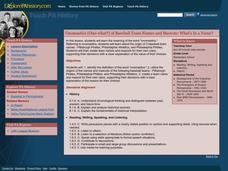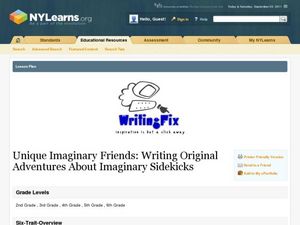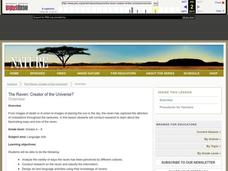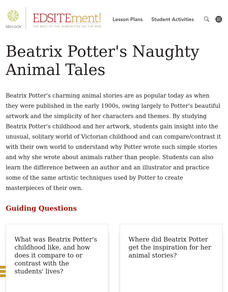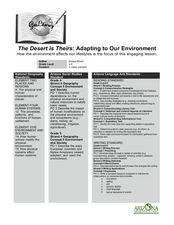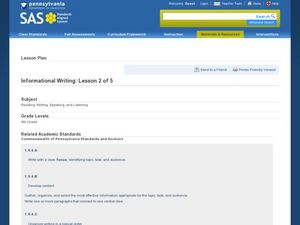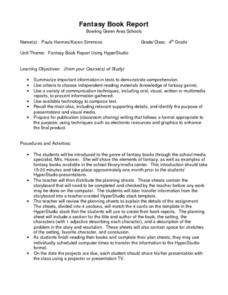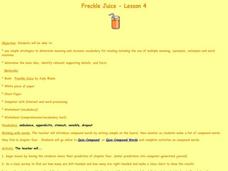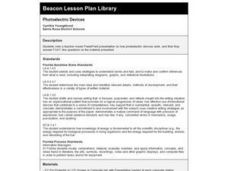Curated OER
What's In a Name?
Students explore onomastics. In this baseball history lesson, students create their own team name and explain the name they chose. After choosing a team name students support their choice with revelant reasons and be able to discuss...
Curated OER
Create a Video Poem
Collaborate to create a visual version of a poem using video. Before class, choose a poem to pick apart. Read it aloud and then analyze it in detail as a class. Assign a line or short section to each student to expand upon using a...
Curated OER
Writing Original Adventures About Imaginary Sidekicks
Students explore storytelling by conceptualizing a story with classmates. In this publishing lesson, students identify the idea development process and discuss word choice when writing a story. Students utilize a graphic organizer to...
Curated OER
The Raven: Creator of the Universe?
Students explore biology by researching birds in class. In this raven identification lesson, students utilize the Internet to identify the anatomy, habits and habitat of ravens. Students write descriptive paragraphs about ravens and read...
Curated OER
Lesson Refresh: Plan with the END in Mind
Fourth graders identify literary techniques by participating in a class discussion. In this organization activity, 4th graders practice public speaking while presenting ideas for a story to their classmates as well as critiquing the...
Curriculum Corner
ELA Common Core Checklists for K-6
In the hustle and bustle of life in the classroom, it's easy for teachers to lose track of the standards they have taught, and those that still need to be addressed. This Common Core checklist provides educators with an easy-to-use...
Curated OER
Writing a Character Sketch
Combining descriptive and expository writing skills, middle schoolers create a character sketch about someone they know well. They use a graphic organizer to help them discuss a model character sketch and organize/write one of their own....
Curated OER
Narrative Literature Response Letters: Original Lesson Plan
Readers write a formal letter to an author offering an alternative ending to a story the author has written. First, the class reads a story or novel. Upon finishing the reading, they are introduced to the format of a formal letter. They...
Denver Art Museum
The Poetry in Non-Events
The photograph, Nellie and her Italian Soda is viewed and discussed by the class. They are instructed to use the photograph as inspiration to write a poem about non-events, or things that are beautiful in every day life. Pupils use a...
Curated OER
Beatrix Potter's Naughty Animal Tales
Students gain insight into the unusual, solitary world of Beatrix Potter's Victorian childhood and can compare/contrast it with their own world to explain why Potter wrote such simple stories and why she wrote about animals rather than...
Curated OER
Christopher Columbus, The Explorer
Students brainstorm important facts about Christopher Columbus, input information into Kidspiration or Inspiration, watch United Streaming Video on Christopher Columbus and New World to gather information, research online to find...
Curated OER
Venerable Inventors
Students discuss important historic inventors and read their biographical information. In this world history lesson, students describe Alexander Bell, Thomas Edison, and Guglielmo Marconi using vocabulary terms used in their text....
Curated OER
The Desert is Theirs: Adapting to Our Environment
Students determine how animals and people adapt to the desert environment. In this desert lesson, students review vocabulary about the desert and how humans have to make changes to accommodate their environments. They listen to and...
Curated OER
Build an Indoor Compost Bin
Students write an essay to describe the contents of a compost bin. In this composting lesson, students create a compost bin. Students examine soil for its contents and explains in an essay the impact of the soil on the environment.
Pennsylvania Department of Education
Informational Writing: Lesson 2 of 5
Introduce expository writing to your elementary learners. Young authors write a three-paragraph informational paper using the steps of the writing process. They follow guided lessons to experience each of five steps. Included are tons of...
Curated OER
Fantasy Book Report
Fourth graders choose a fantasy genre to research and summarize information on in text. They utilize a variety of communication techniques, including oral, visual as well as written/multimedia reports and then present information...
Curated OER
Searching for a Career
Learners research their dream career while taking notes. They create a timeline for reaching their career goal.
Curated OER
Freckle Juice
Students analyze a chapter from the assigned book they are reading. For this reading comprehension lesson, students read chapter four from Freckle Juice by Judy Blume, and discuss the main character, Andrew. Students complete a...
Curated OER
A Garden of Verses: Poems About Class Gardens
Young scholars explore botany by participating in a language arts activity. In this garden poetry lesson, students read the classic poem "Mary, Mary Quite Contrary" and discuss the imagery and rhyming methods used. Young scholars examine...
Curated OER
Photoelectric Devices
Fourth graders view a teacher-made PowerPoint presentation on how photoelectric devices work, and then they answer FCAT-like questions on the material presented. They answer questions about what they viewed in an assignment imbedded in...


